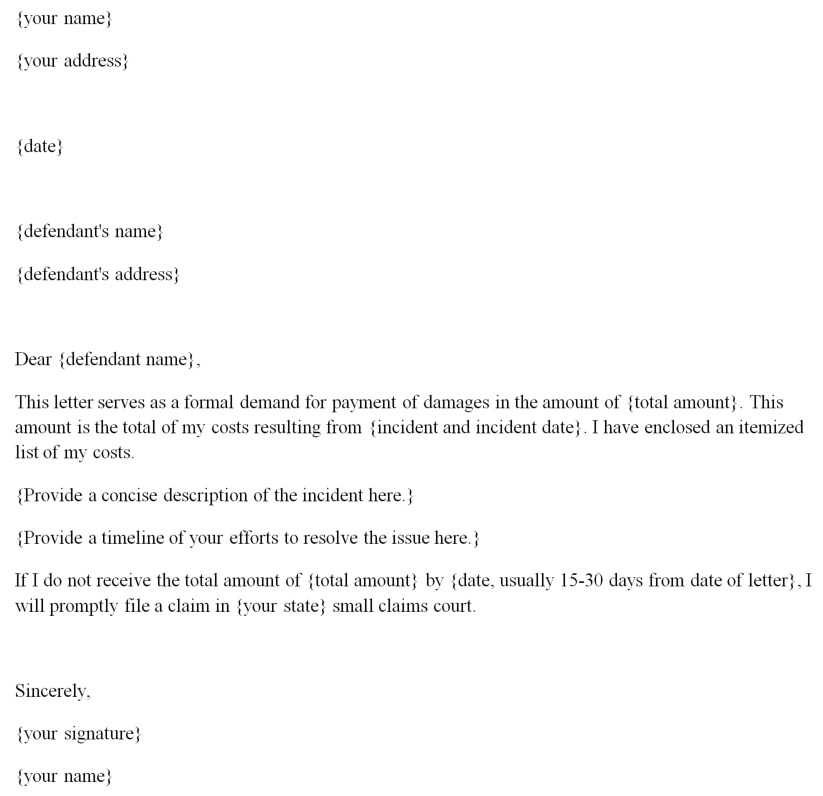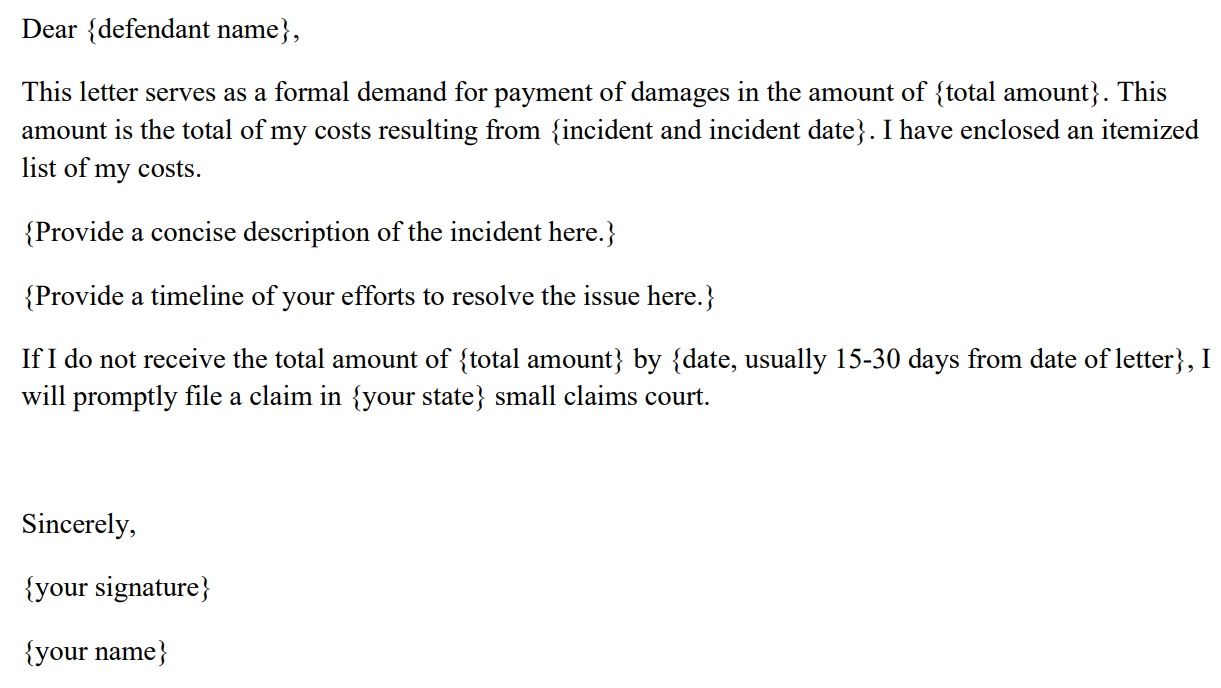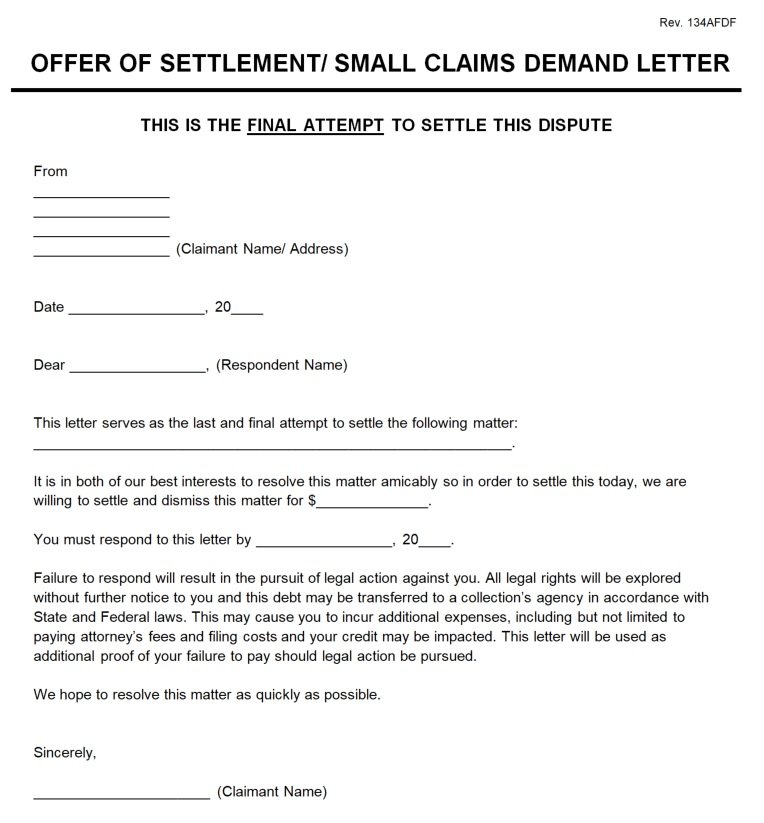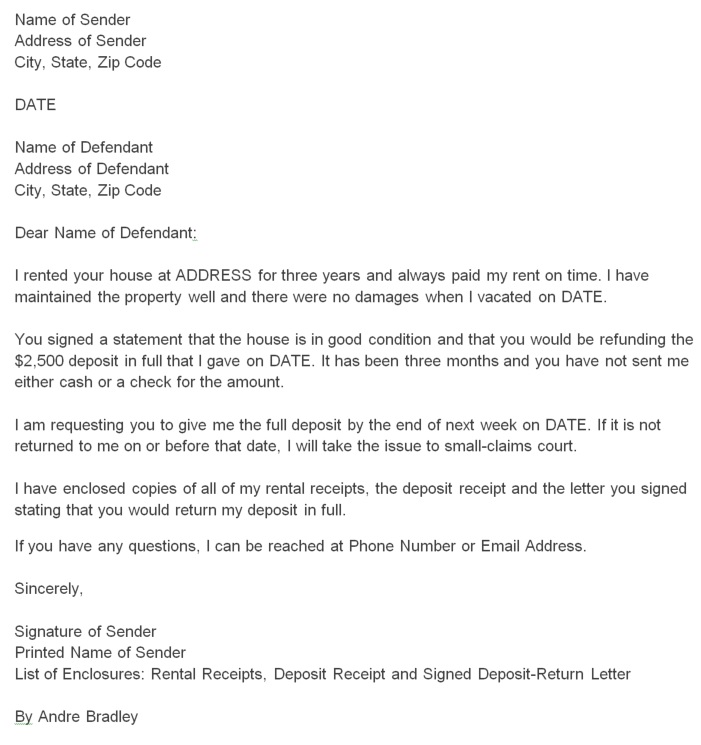A small claims demand letter is a formal letter used to peaceably resolve a small claims dispute without taking them to court. You must consider sending a demand letter before filing a small claims lawsuit in your local small claims court.
Table of Contents
What is a small claims court?
Small claims court is a type of civil court often known as a ‘people’s court’ or ‘conciliation court.’ They handle disputes involving small amounts of money. Before you file your lawsuit, you should send a small claims demand letter. This letter acts as substantial proof in case you have to litigate the issue.
Why should you send a small claims demand letter?
Here are the reasons for sending a demand letter;
- You may need to ask the other party to pay you back before filing on the basis of what state you are filing a small claims court lawsuit. Sending this letter is an efficient way of completing this requirement.
- This letter shows the recipient that you are serious about the problem.
- Without going to small claims court, you may lead to a resolution by sending a demand letter.
How to file a small claims case?
It is fairly easy to prepare a small claims case. You just have to bring proof of the original agreement and the amount that you are owed. Consider the following step to file a small claims case;
Write a small claims demand letter
The first step you will have to take is to write a small claims demand letter. It could be enough to give a threat of the court to convince some people to pay. Your letter must include proof of your claim so that the other person cannot easily dispute it.
However, there is no need to take further action if they pay within the time specified in your small claims demand letter. On the other hand, you need to move forward with the case if they refuse to respond to the small claims demand letter.
File your case
Filing a complaint and small claims summons is the next step. In your local small claims court, you can find complaints and summons forms. It would be recommended to include exhibits in your complaint that indicate proof of the agreement and the money owed.
Serve your small claims complaint
Use a certified registered mail to send out a summons. Your complaint must specify when they will appear in court for the case and for what reason. Furthermore, the defendant has to sign it in person. The court will most likely side with you if the other party fails to appear in court. Also, they have to pay you the amount in question.
Attend the hearing
For your hearing, the court will set a date and you must appear in court at that time to present your case. In small claims court, there is just the plaintiff and the defendant. Also, you can’t have an attorney represent you in small claims court in many states. However, you can take advice from an attorney before the case. In case, you don’t attend the hearing, your case might be dismissed by the court or side with the defendant.
Wait for the judge’s final decision
Unlike civil cases, small claim cases take less time on the whole. These cases are usually resolved within 30 minutes. The judge will then issue their final judgment. Additionally, you may file an appeal with the Court of Appeals if you aren’t satisfied with the judge’s decision.
Sending a demand letter:
You should send your small claims court demand letter through email or mail. Consider the following while sending your letter by mail;
Tracking
You must track your small claims demand letter. This way, you can determine whether or not the letter reached the recipient to whom you sent the demand letter.
Signature required
The postal carrier must hand-deliver the letter in case you send a letter with the receiver’s signature requested. But, a signature request might not be necessarily required. It would be recommended never to send a letter to someone’s home address with a signature required.
What to include in a small claims demand letter?
Include the following details in your small claims demand letter;
- The specific amount that you claim to be owed
- A reason that led to that amount being owed
- The specific date when the amount owed to you
- The time you are giving to the recipient to pay you
- Your next step if they don’t pay you
Moreover, specify in the letter how you have reached them about the issue in the past. After receiving the small claims demand letter, the other party will pay if all goes well. Otherwise, the letter becomes proof of your case if they don’t pay. This letter indicates that you made several attempts to resolve the issue before going to court. Thus, it will strengthen your case.
What types of cases can you file in small claims?
These are as follows;
- Landlord/Tenant disputes over the security deposit or early termination of the lease
- Unpaid rent
- Roommate disputes
- Disputes over loans
- Contracts (written and oral)
- Auto accidents
- Disputes over auto repairs
- Disputes over remodeling or home repairs
- Damage caused to property
- Unpaid bills
FAQ’s (Frequently Asked Questions)
The cost to sue someone in small claims depends on how much you are suing for. To find out about filing fees, check with your local small claims court. Usually, it ranges from $15-$75 to file a lawsuit in small claims court.
You can ask the court about fee waivers if you cannot afford to pay court fees. The serving fees (an act of informing someone that they have been sued) can range from $0 – $125.
Here is what to expect from a small claims court hearing;
The judge will ask the parties before the hearing to present each other the proof that they bring with them. Here, you will specify in court that you have sent a demand letter.
After that, the judge starts hearing properly and asks the individual who is suing and the reason for suing. The individual who has been sued, the judge will turn to him/her. Then, they tell the story of their side.
The hearing usually ends in 15 minutes.
After the hearing, the judge will tell the parties about their final judgment. Instead, the judge should mail the decision to the parties.
Collecting all important documentation is the most important thing. A written contract is the best although a verbal contract is legal but it would be difficult to prove them. Here, the written contract refers to a text or email in which someone agreed to pay you.
Take images of the property damage if your case involves any damaged property. You can strengthen the case if you have images of what the property looked like before. Take a copy of your small claims demand letter and other records documenting along with you. This will show your attempts to reach the defendant for payment.




